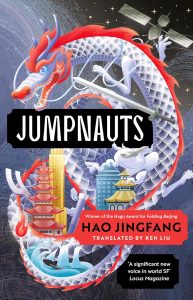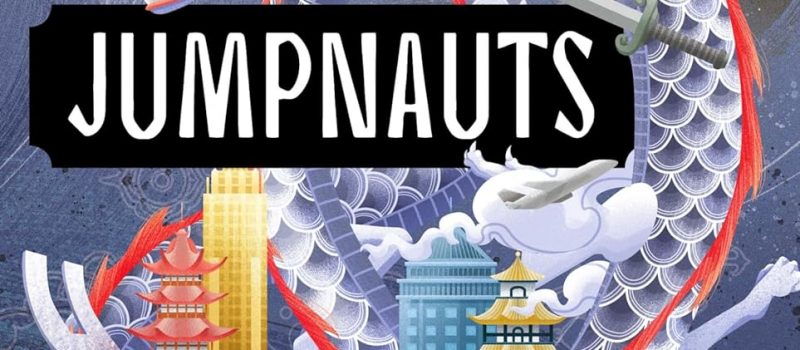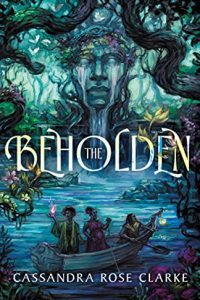Niall Harrison Reviews Jumpnauts by Hao Jingfang
 Jumpnauts, Hao Jingfang (trans. Ken Liu) (Saga 978-1-53442-211-7, 368pp, $18.99). March 2024.
Jumpnauts, Hao Jingfang (trans. Ken Liu) (Saga 978-1-53442-211-7, 368pp, $18.99). March 2024.
Deep in the bowels of Hao Jingfang’s Jumpnauts, an alien guide reveals to the human protagonists that what defines civilisational progression, from their elevated perspective, is ‘‘the capacity for information exchange.’’ The development of writing, which allows information to be transmitted widely in space and time, was the necessary precondition to reach the ‘‘zeroth rank’’ of ‘‘the standard civilization grading scale;’’ even now (‘‘now’’ being the late 21st century), Moore’s Law has only dragged humanity up to the third rank. The next stage is direct brain-brain communication, which requires an ability to manipulate gryons, fundamental particles that mediate the flow of information.
Yun Fan, the resourceful daughter of the archaeologist who uncovered ancient evidence of human-alien contact, is pragmatic about this possibility, immediately quizzing the guide on how and why and what, exactly, having such an ability would be like. Qi Fei, a serious-minded military officer, is terrified by the prospect of exposing his innermost thoughts, the shadows of his mind, to those around him. Jiang Liu, a playboyish would-be informational Robin Hood, is more casual about it: ‘‘‘Shadows are like asses,’ Jiang Liu said. ‘Who can live without an ass? Once you accept that, it’s no big deal to have someone see your backside.’’’
Thus the dominant tone of Jumpnauts: big ideas and slightly tortuous banter. First published in China in 2021, now translated into English by Ken Liu, it has a rather different vibe both to the lucid socioeconomic thought-experiment of Hao Jingfang’s Hugo-winning story ‘‘Folding Beijing’’ (2014 / 2015 English) and to the careful, compassionate, absorbing, and Arthur C. Clarke Award-shortlisted Vagabonds (2016 / 2020 English). With a geopolitical context of impending war – between the Atlantic Alliance and the Pacific League – Jumpnauts positions itself for the most part in military-SF-thriller territory, its brisk and breezy narrative shepherding its core trio from a spot of light tomb raiding at the Mausoleum of Qin Shi Huang (the first emperor of China), which turns out to have a neutrino detector hidden in its basement, to the first contact scenario mentioned above, then into another universe entirely, and then back to Earth. But every so often, it sidebars into several pages of mannered debate:
“Your choice of words evokes oppression,” Qi Fei said. “But I prefer an alternative way of phrasing: out of many, one. Xunxi writes, ‘The righteous path gathers orderly distinctions into harmony….’
Jiang Liu smiled. “Nice quote. But let me respond with another quote: ‘Why is it that those above cannot regulate those below, and those below cannot serve those above?….’
Qi Fei nodded. “But you are quoting from Exalting Unity, which explicitly advocates for a unified conception of what is right.”
These sections are fascinating – and more consistently successful, for me, than the thriller aspects of the novel – and reminiscent of debates in Vagabonds. Over the course of the novel, a whole array of Chinese philosophers are discussed, including Xunxi, Mozi, Confucius, and Yangming, and occasionally put into intriguing dialogue with SF reference points: Liu Cixin’s take on the “dark forest” view of a hostile universe and Ursula K. Le Guin’s Omelas both get a mention. But (at least for this Anglophone Western reader) the switches between the two modes takes a bit of getting used to. In the main plot of the novel, Jiang Liu and Qi Fei are broadly drawn, and repeatedly demonstrate their emotional immaturity, particularly when it comes to Yun Fan (‘‘Why can’t the two of you just shut up?’’ she demands when their peacocking gets out of hand, very much speaking for me), but turn the page, and you will find them engaged in sophisticated debate about the intellectual precedents for their situation. It is a little as though an action-adventure cartoon is repeatedly interrupted by an academic seminar (or, given my preference, vice versa).
The contrast is probably the point. Jiang Liu and Qi Fei’s conflict is a microcosm of the larger geopolitical conflict, and the proposed resolution is the same: Communicate better. Understand each other better. That takes us back to the imperfections of writing, and language itself, as a mediator; following the guide’s lesson on civilizational hierarchy, the characters reflect on the Confucian virtue of Ren, glossed as ‘‘you and I, being human together,’’ but immediately caveated (in a paragraph that seems to speak directly to the reader, and echoes the cautions in Ken Liu’s foreword to the novel) as having ‘‘no exact translation.’’ So to become better at being human together, the novel’s characters have to start to move beyond words. I think Jingfang struggles to make this solution compelling – moving beyond words in a word-driven medium is obviously difficult on the face of it, but among other things, the characters’ experience of their new unity just feels implausibly safe – but she may not be done yet. On the novel’s last page, the story seems to remain open; and if the seminar stays open with it, I’ll be happy to follow the debate further.
In Niall Harrison‘s spare time, he writes reviews and essays about sf. He is a former editor of Vector (2006-2010) and Strange Horizons (2010-2017), as well as a former Arthur C. Clarke Award judge and various other things.
This review and more like it in the March 2024 issue of Locus.
 While you are here, please take a moment to support Locus with a one-time or recurring donation. We rely on reader donations to keep the magazine and site going, and would like to keep the site paywall free, but WE NEED YOUR FINANCIAL SUPPORT to continue quality coverage of the science fiction and fantasy field.
While you are here, please take a moment to support Locus with a one-time or recurring donation. We rely on reader donations to keep the magazine and site going, and would like to keep the site paywall free, but WE NEED YOUR FINANCIAL SUPPORT to continue quality coverage of the science fiction and fantasy field.
©Locus Magazine. Copyrighted material may not be republished without permission of LSFF.






